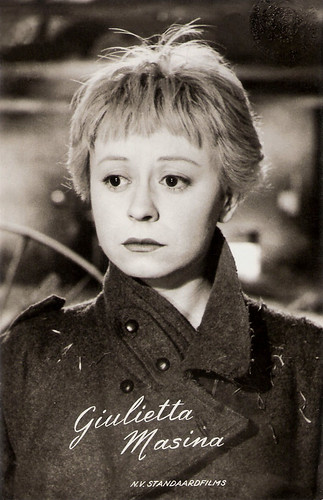
Dutch postcard by Uitg. Takken, Utrecht, no. 3381. Photo: N.V. Standaardfilms. Giulietta Masina as Gelsomina in La strada (1954).

Dutch postcard by Uitg. Takken, Utrecht, no. 3382. Photo: N.V. Standaardfilms. Giulietta Masina as Gelsomina in La strada (Federico Fellini, 1954).
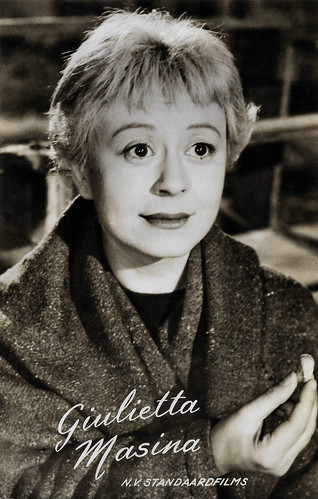
Dutch postcard by Uitg. Takken, Utrecht, no. 3383. Photo: N.V. Standaardfilms. Giulietta Masina as Gelsomina in La strada (Federico Fellini, 1954).
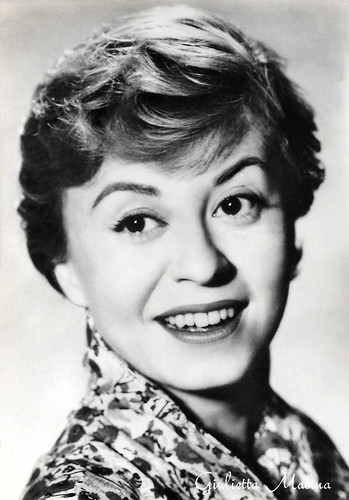
Italian postcard by Rotalfoto, Milano, no. 446. Photo: Titanus. Giulietta Masina in Il bidone (Federico Fellini, 1955).

Italian postcard by Casa Edite. Ballerini & Fratini, Firenze (Florence), no. 3180. Photo: Titanus. Publicity still for Il bidone (1955).
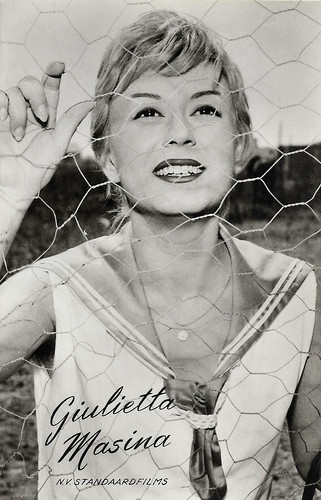
Dutch postcard by Uitg. Takken, Utrecht, no. 3380. Photo: N.V. Standaardfilms. Giulietta Masina in Le notti di Cabiria (Federico Fellini, 1957).

Italian postcard by Bromostampa, Milano in the series 'Hobby' (made to collect autographs by famous film stars). Giulietta Masina in Fortunella (Eduardo De Filippo, 1958), scripted by Federico Fellini, Ennio Flaiano and Tullio Pinelli. The film centres on a poor girl (Masina) who is convinced she is the daughter of a prince (Aldo Salvini).

Swiss postcard by News Productions, Baulmes / Filmwelt Berlin, Bakede / News Productions, Stroud, no. 56517. Photo: Collection Cinémathèque Suisse, Lausanne. Caption: Giulietta Masina & Federico Fellini, 1965.
Federichino
Giulia Anna Masina was born in San Giorgio di Piano near Bologna in 1921. Her parents were Gaetano Masina, a violinist and a music teacher, and Anna Flavia Pasqualin, a schoolteacher. She had three elder siblings: Eugenia, and twins Mario and Maria.
Giulietta spent most of her teenage years in Rome at the home of a widowed aunt, where she cultivated a passion for the theatre. She attended the Hermanas Ursulinas school and graduated in Literature from the Sapienza University of Rome. At university, she turned to acting. From 1941 on, she participated in numerous plays that included singing, dancing, and acting, all in the Ateneo Theater of her university.
In 1942, she joined the Compagnia del Teatro Comico Musicale and played various roles on stage. After seeing her photographs, she was cast by Federico Fellini, who was writing the radio serial 'Terziglio' about the adventures of the newlyweds Cico and Pallina.
Masina and Fellini fell in love while working on the successful program and were married in 1943. Several months after her marriage to Fellini, in 1943, Masina suffered a miscarriage after falling down a flight of stairs. She became pregnant again. Pierfederico (nicknamed Federichino) was born on 22 March 1945 but died just a month later on 24 April owing to respiratory insufficiency. Masina and Fellini did not have another child.
Despite distancing herself from live theatre, Masina did return to the university stage for some time acting with Marcello Mastroianni. Her last stage appearance was in 1951. Working together with her husband, Masina made the transition to on-screen acting. Half of her Italian films, the most successful ones, would be either written or directed by her husband.
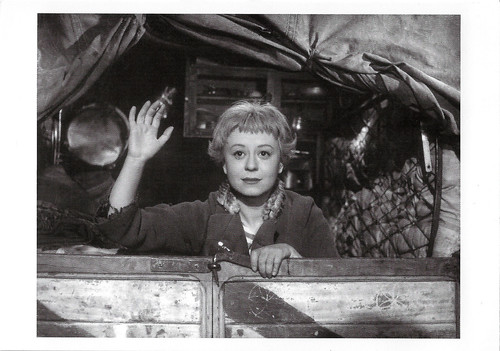
French postcard by DR / Le Cinémathéque Française. Giulietta Masina as Gelsomina in La strada (Federico Fellini, 1954).
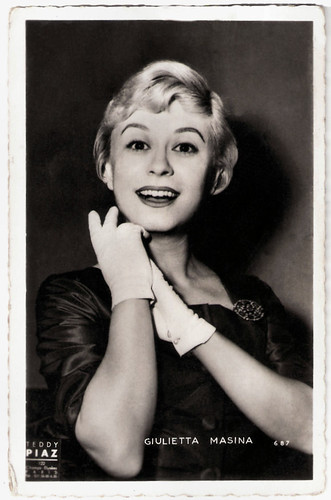
French postcard by Editions P.I., Paris, no. 687. Photo: Teddy Piaz, Paris.
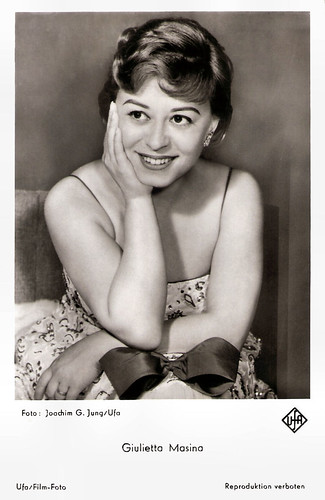
German postcard by Ufa, Berlin-Tempelhof, no. FK 4154. Photo: Joachim G. Jung / Ufa.
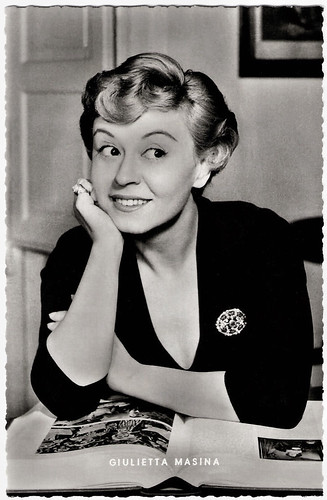
German postcard by Kunst und Bild, Berlin-Charlottenburg, no. V 169. Photo: Unitalia Film / Luxardo / Alessi.
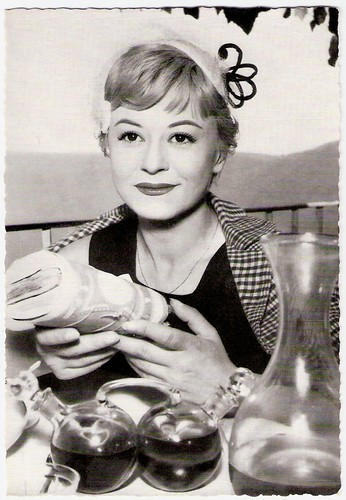
German postcard by WS-Druck, Wanne-Eickel, no. 236. Photo: Filmpress Zürich. Giulietta Masina in Le notti di Cabiria (Federico Fellini, 1957).

Belgian postcard by Lotto Photo.
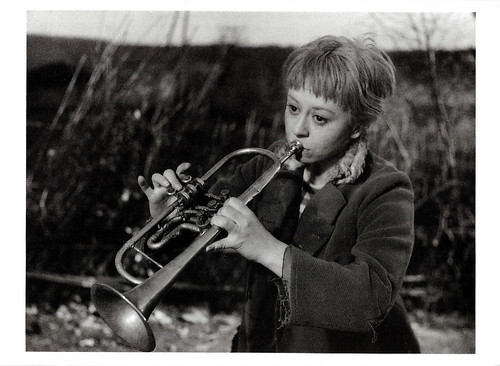
Swiss postcard by Collection Cinémathéque Suisse, Lausanne / News Productions, Baulmes, no. 56518. Photo: Ponti - De Laurentis. Giulietta Masina as Gelsomina in La strada (Federico Fellini, 1954).

British postcard by BFI and Picturehouse. Photo: Studio Canal. Caption: Fellini with Giulietta Masina on the set of Le notti di Cabiria / Nights of Cabiria (1957).
Cabiria and Gelsomina
Giulietta Masina made her film debut in an uncredited role in the Neo-realist war drama Paisà / Paisan (Roberto Rossellini, 1946), co-written by Fellini. She received her first screen credit in the crime drama Senza pièta / Without Pity (Alberto Lattuada, 1948) starring Carla del Poggio, which was another adaptation by Fellini. Masina’s performance earned her a Silver Ribbon, Italy's most prominent film award, as Best Supporting Actress.
She then co-starred in Fellini’s début as a director, Luci del varietà / Variety Lights (Federico Fellini, Alberto Lattuado, 1950) with Peppino di Filippo and Carla del Poggio. It is a bittersweet drama about a bunch of misfits in a travelling Vaudeville troupe. A box office hit was the prostitution drama Persiane chiuse / Behind Closed Shutters (Luigi Comencini, 1951) with Massimo Girotti and Eleonora Rossi Drago. She had a supporting part in Europa '51 / The Greatest Love (Roberto Rossellini, 1952) starring Ingrid Bergman.
She also appeared in the second film of her husband, the hilarious comedy Lo sceicco bianco / The White Sheik (Federico Fellini, 1952) featuring Alberto Sordi. At AllMovie, Hal Erickson added (his review is now sadly deleted): “Featured in the cast is Fellini's wife Giulietta Masina as a prostitute named Cabiria, who'd be given a vehicle of her own, Nights of Cabiria, in 1955. Based on ‘an idea’ by Michelangelo Antonioni, The White Sheik was the main inspiration for Gene Wilder's The World's Greatest Lover (1977).”
After some lesser films by other directors, she finally had her international breakthrough in Fellini's La strada / The Road (Federico Fellini, 1954), as the young Gelsomina, who is sold to the violent travelling strongman Zampano (Anthony Quinn) by her poor mother. At IMDb, Matt Whittle writes: “Giulietta Masina is the highlight of the film. With a face like no other, it exudes a certain beauty but is also very odd, with a definite quirkiness to it.” She was also co-starring in Fellini’s next, lesser-known effort Il bidone / The Swindle (Federico Fellini, 1955) with Broderick Crawford, Richard Basehart, and Franco Fabrizi as a trio of con artists who victimise the Italian bourgeoisie who are shown to be no better than the crooks. Masina played Basehart’s wife.
In 1957, she won the Best Actress Award at the Cannes Film Festival for her portrayal of the title role in Fellini's widely acclaimed Le notti di Cabiria / Nights of Cabiria (Federico Fellini, 1957). She played the innocent prostitute Cabiria who was born to lose - but still never would give up. In 1956 and 1957, Fellini and Masina were awarded the Academy Award for Best Foreign Film, for La strada, and for Le notti di Cabiria. In the following years, Masina appeared in several films by other directors, including the prison drama Nella città l'inferno / ...and the Wild Wild Women (Renato Castellani, 1959) with Anna Magnani and the German-Italian production Jons und Erdme / Jons and Erdme (Victor Vicas, 1959) opposite Carl Raddatz.

German postcard by ISV, no. D 15. Photo: ISV.
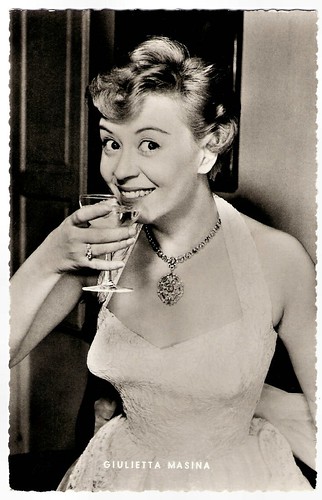
German postcard by Kunst und Bild, Berlin-Charlottenburg, no. S 772. Photo: Unitalia Film / Luxardo / Alessi.
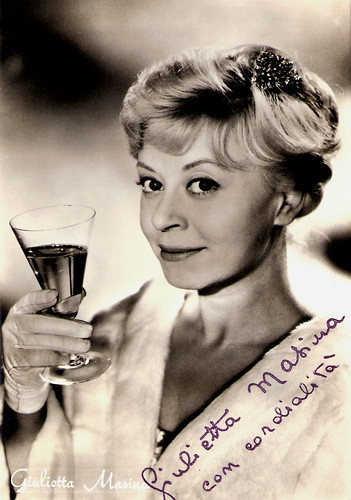
Italian postcard by Rotalfoto, Milano, no. 907.

Russian postcard.
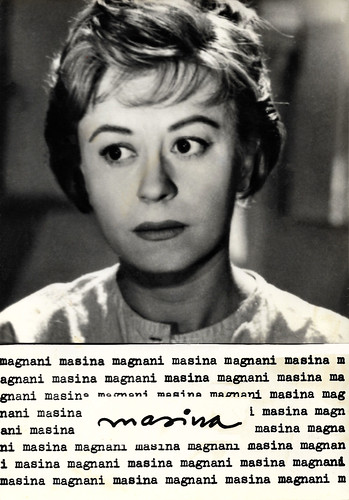
Italian postcard by La Rotografica Romana. Giulietta Masina in Nella città l'inferno / ...and the Wild Wild Women (Renato Castellani, 1959).

Romanian postcard by Casa Filmului Acin.
Ginger
In 1960, Giulietta Masina's career was damaged by the critical and box office failure of the massive international production Das kunstseidene Mädchen / The High Life (Julien Duvivier, 1960) with Gustav Knuth and Gert Fröbe. Subsequently, she became dedicated almost entirely to her personal life and marriage. Nonetheless, she again worked with her husband in Giulietta degli spiriti / Juliet of the Spirits (Federico Fellini, 1965), which earned both the New York Film Critics Award (1965) and the Golden Globe Award (1966) for Best Foreign Language Film.
In 1969, Masina did her first work in English in The Madwoman of Chaillot (Bryan Forbes, 1969) which starred Katharine Hepburn. From 1966 to 1969, Masina hosted a popular radio show, 'Lettere aperte a Giulietta Masina', in which she addressed correspondence from her listeners. The letters were eventually published in a book.
From the 1970s on, she appeared on television. Two performances, Eleonora (Silverio Blasi, 1973) and Camilla (Sandro Bolchi, 1976), respectively, were particularly acclaimed. After almost two decades, Masina appeared in Fellini's Ginger e Fred / Ginger and Fred (Federico Fellini, 1986).
Hal Erickson: "Fellini gently lampoons the world of small-time show business (...) Masina and Marcello Mastroianni star as Amelia Bonetti and Pippo Botticella, a onetime celebrity song-and-dance team. Having risen to fame with a dancing act where they recreated the acts of Ginger Rogers and Fred Astaire (hoping to become the Fred and Ginger of Italy), Amelia and Pippo parted company to pursue their separate lives. Neither one was particularly successful in other fields of endeavor, so when after many years Amelia is offered a guest-star gig on a TV variety show, she jumps at the chance. (...) The overall good cheer of the film was dampened when the real Ginger Rogers sued the distributors of Ginger and Fred for 'defamation of character'."
Masina then rejected outside offers to attend to her husband's precarious health. Her last film was Aujourd'hui peut-être / A Day to Remember (Jean-Louis Bertucelli, 1991). Giulietta Masina died from lung cancer in 1994, aged 73, less than five months after her husband's demise. They are buried together at Rimini cemetery in a tomb marked by a prow-shaped monument, the work of sculptor Arnaldo Pomodoro.
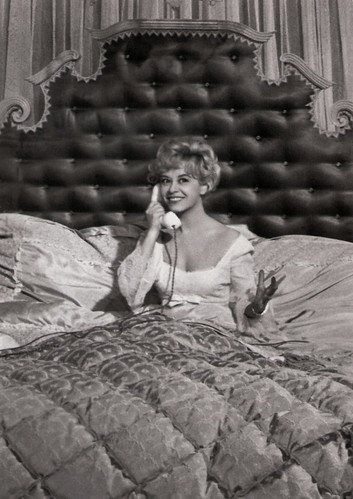
Vintage card. Giulietta Masina in Das kunstseidene Mädchen / The High Life (Julien Duvivier, 1960).

Vintage card. Giulietta Masina in Das kunstseidene Mädchen / The High Life (Julien Duvivier, 1960).

Vintage card. Giulietta Masina in Das kunstseidene Mädchen / The High Life (Julien Duvivier, 1960).

Vintage card. Giulietta Masina in Das kunstseidene Mädchen / The High Life (Julien Duvivier, 1960).

Vintage card. Giulietta Masina in Das kunstseidene Mädchen / The High Life (Julien Duvivier, 1960).

Vintage card. Giulietta Masina in Das kunstseidene Mädchen / The High Life (Julien Duvivier, 1960).

Vintage card. Giulietta Masina in Das kunstseidene Mädchen / The High Life (Julien Duvivier, 1960).

Russian postcard by Izdanije Byuro Propogandy Sovietskogo Kinoiskusstva, no. 109/75, 1975. This postcard was printed in an edition of 200.000 cards. The price was 5 kop.

German press photo by Tobis. Giulietta Masina in Ginger e Fred / Ginger and Fred (Federico Fellini, 1986).
Sources: Matt Whittle (IMDb), Jason Ankeny (AllMovie - Page now defunct), Hal Erickson (AllMovie - Page now defunct), F.T. (Italica - now defunct), Wikipedia, and IMDb.
No comments:
Post a Comment